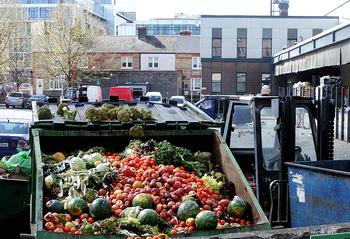
LONDON, UK, January 11, 2013 (ENS) – Four billion tonnes of food a year are produced globally. Yet, due to poor practices in harvesting, storage and transportation, as well as market and consumer wastage, between 30 and 50 percent of all food produced each year never feeds a human being, finds a new report by the Institution of Mechanical Engineers, a registered British charity.
“This level of wastage is a tragedy that cannot continue if we are to succeed in the challenge of sustainably meeting our future food demands,” the Institution of Mechanical Engineers said in a statement Thursday releasing the report, “Global Food: Waste Not Want Not.”

“The amount of food wasted and lost around the world is staggering,” said Dr. Tim Fox, who heads the Energy and Environment Division at the Institution.
“This is food that could be used to feed the world’s growing population – as well as those in hunger today. It is also an unnecessary waste of the land, water and energy resources that were used in the production, processing and distribution of this food,” said Fox.
The reasons for this situation range from poor engineering and agricultural practices, inadequate transport and storage infrastructure through to supermarkets demanding cosmetically perfect foodstuffs and encouraging consumers to overbuy through buy-one-get-one free offers.
In less-developed countries, such as those of sub-Saharan Africa and Southeast Asia, wastage tends to occur primarily at the farmer-producer end of the supply chain.
Inefficient harvesting, inadequate local transportation and poor infrastructure mean that produce is frequently handled inappropriately and stored under unsuitable farm site conditions. In India, the report finds, 21 million tonnes of wheat is wasted each year due to inadequate storage and distribution systems.
In mature, fully developed countries, more-efficient farming practices and better transport, storage and processing facilities ensure that a larger proportion of the food produced reaches markets and consumers. Yet, consumer cultural standards dictate that produce is often wasted through retail and customer behavior.
Major supermarkets, in meeting consumer expectations, will often reject entire crops of perfectly edible fruit and vegetables at the farm because they do not meet exacting marketing standards for their physical characteristics, such as size and appearance.
For example, up to 30 percent of the UK’s vegetable crop is never harvested as a result of such practices.

Globally, retailers generate 1.6 million tonnes of food waste annually in this way.
Of the produce that does appear in the markets, commonly used sales promotions encourage customers to purchase excessive quantities which, in the case of perishable foodstuffs, generate wastage in the home.
Overall between 30 percent and 50 percent of what has been bought in developed countries is thrown away by the purchasers.
In the UK, the report estimates that seven million tonnes of food valued at about £10 billion is thrown away from homes every year.
Global food production now takes up about 50 percent of the available suitable land, the report estimates, adding that the amount of land used for towns and cities is relatively small and, despite future growth of urban areas, is “unlikely to become significant in proportional terms.”
Land used for producing wasted food reduces the land available to grow renewable energy crops or to support natural resources such as forests and wildlife, the report points out.
“Considerable tensions are likely to emerge as competition develops for use of available land between the need for food production, demands for preservation of ecosystems and the desire to produce biomass as a source of renewable energy.”
“As water, land and energy resources come under increasing pressure from competing human demands, engineers have a crucial role to play in preventing food loss and waste by developing more efficient ways of growing, transporting and storing foods,” said Dr. Fox.
“But in order for this to happen governments, development agencies and organizations like the UN must work together to help change peoples’ mindsets on waste and discourage wasteful practices by farmers, food producers, supermarkets and consumers,” he said.
Today, the world population stands at approximately 7,059,016,541 people.
By 2075, the United Nations’ mid-range projection for global population growth predicts that human numbers will peak at about 9.5 billion people.

Rising population combined with improved nutrition standards and shifting dietary preferences will exert pressure for increases in global food supply.
Engineers, scientists and agriculturalists have the knowledge, tools and systems that will assist in achieving productivity increases, but pressure will grow on finite resources of land, energy and water.
The potential to provide 60–100 percent more food by eliminating losses, while simultaneously freeing up land, energy and water resources for other uses, is “an opportunity that should not be ignored,” says the Institution of Mechanical Engineers.
In order to begin tackling the challenge, the Institution recommends that:
1. The UN Food and Agriculture Organization work with the international engineering community to ensure governments of developed nations put in place programs that transfer engineering knowledge, design know-how, and suitable technology to newly developing countries. This will help improve produce handling in the harvest and immediate post-harvest stages of food production.
2. Governments of rapidly developing countries incorporate waste minimization thinking into the transport infrastructure and storage facilities now being planned, engineered and built.
3. Governments in developed nations devise and implement policies that change consumer expectations. These should discourage retailers from wasteful practices that lead to the rejection of food on the basis of cosmetic characteristics, and losses in the home due to excessive purchasing by consumers.
© 2013, Environment News Service. All rights reserved. Content may be quoted only with proper attribution and a direct link to the original article. Full reproduction is prohibited.
